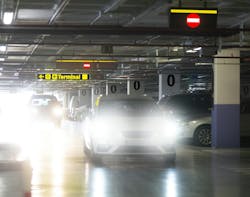British automobile group RAC is calling on the U.K. government to investigate problems with headlight glare after most of the respondents in a survey said that they get “dazzled” by lights when driving at night.
“An RAC survey of 2,000 drivers found a huge nine-in-10 (89%) think at least some headlights on cars on the road today are too bright, of which three-in-10 (28%) — a higher proportion than ever — think most are,” Birmingham, England–based RAC said in reporting the survey results this week. “Of all these drivers who complain about the brightness of car headlights, some 91% say they get dazzled when driving with three-quarters (74%) saying this happens regularly.”
Dazzling poses a safety risk.
“As part of its study, the RAC asked drivers to estimate how long it takes them to see clearly again after getting dazzled by other drivers’ lights,” the group said. “While 68% say it takes between one and five seconds, one-in-10 (11%) say it takes six or more — which, staggeringly, is enough for a driver travelling at 60 mph to cover 160 metres (525 feet), the equivalent of 40 car lengths.”
RAC (formerly the Royal Automobile Club) is a roadside assistance, insurance, and motorist advisory group, loosely similar to the American Automobile Association (AAA).
It has been surveying drivers on headlight brightness since 2018. This year, the survey revealed a noticeable exacerbation “with 85% of those affected stating they believe the problem is getting worse,” the RAC stated.
“Alarmingly, nearly one-in-10 (7%) say they find headlight glare so bad that they avoid driving at night altogether, a figure that rises to 14% for drivers aged 65 and over.”
The RAC said that 87% of “dazzled drivers” blame lights that appear to be too bright.
“This could be as a result of the increasing prevalence of cars fitted with LED headlights, leading to a much more intense and focused beam that the human eye reacts differently to, compared to a conventional ‘yellower’ halogen bulb,” the RAC suggested. “While LED headlights are great for improving a driver’s view of the road ahead, this can be to the detriment of other road users who encounter them.”
Brightness is not the only possible culprit, as 44% of the respondents said that poorly aligned headlights could be at fault.
Other than the reference to “‘yellower’ halogen” the RAC did not mention spectra. In recent years, similar reports have linked increases in the blue spectra associated with LEDs to glare and discomfort.
“The increasing popularity of cars that sit higher on the road, especially SUVs, may also be a factor with those in conventional cars such as hatchbacks, saloons or estates suffering the most. Six-in-10 drivers (62%) of conventional cars blame the dazzling on higher vehicles, whereas only 35% of those in higher vehicles point the finger similarly sized vehicles,” the RAC reported.
“But whatever the cause or causes of headlight glare, it is clear how strongly drivers feel about the issue with 81% saying more should be done to tackle it — a figure that rises to 87% among drivers aged 45 to 54.”
The RAC further noted that since 2013, an average of 280 collisions per year have involved dazzling headlights, with six of those collisions including a fatality.
MARK HALPER is a contributing editor for LEDs Magazine, and an energy, technology, and business journalist ([email protected]).
Follow our LinkedIn page for our latest news updates, contributed articles, and commentary, and our Facebook page for events announcements and more. You can also find us on the X platform.

Mark Halper | Contributing Editor, LEDs Magazine, and Business/Energy/Technology Journalist
Mark Halper is a freelance business, technology, and science journalist who covers everything from media moguls to subatomic particles. Halper has written from locations around the world for TIME Magazine, Fortune, Forbes, the New York Times, the Financial Times, the Guardian, CBS, Wired, and many others. A US citizen living in Britain, he cut his journalism teeth cutting and pasting copy for an English-language daily newspaper in Mexico City. Halper has a BA in history from Cornell University.





